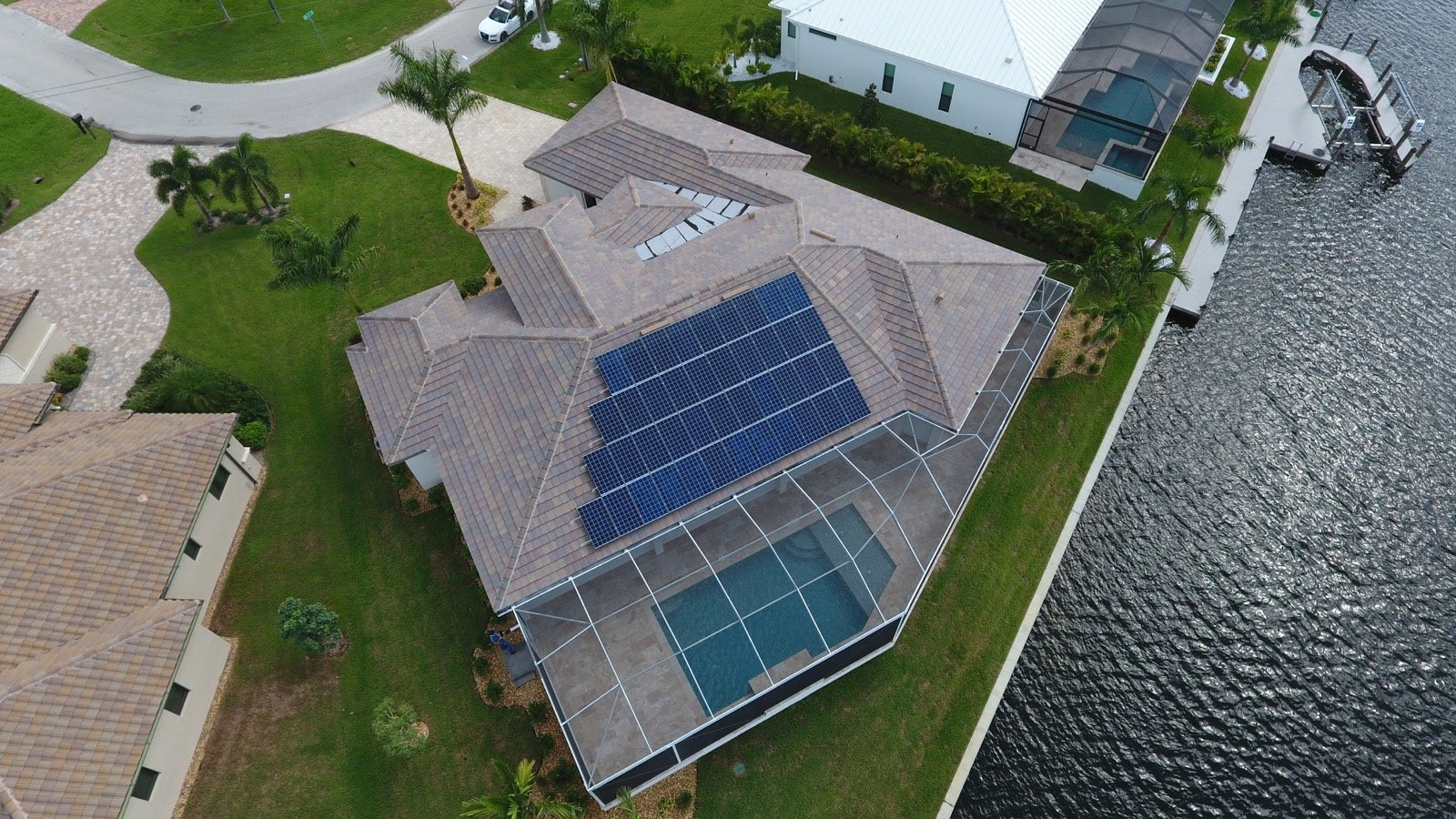The Russian War on Ukraine has created a great big spotlight on the geopolitical problems of being so dependent on fossil fuels and the authoritarian regimes that much of the industry source from. In addition to, of course, that whole global warming issue. As if we needed any other reason to get the heck off of fossil fuels.
With this a renewed spotlight is on renewables. There is still a lot of work to do in building the transmission lines and industrial-scale batteries to expand solar and wind farms. Nuclear has a bright future with small modular reactors but those plants take 5-10 years at best to stand up. So what about rooftop solar? These panels are ready to go and be deployed and can quite immediately boost renewable energy as a share of our total energy supply.
They are also far cheaper than ever before. Prices for solar panels themselves are down 90% since 2010, primarily due to low cost manufacturing in China. The average cost of solar rooftop installation (including the panels) for US households is down 75% since 2000, from $80,000 on average to $20,000 on average, and that’s before state tax incentives that can bring those costs down even further. Most solar providers now offer lease programs that carry $0 upfront costs and instead take a % of the proceeds those homes earn from selling electricity back into the grid.
In addition, a study from Chris Clac from Vibrant Clean Energy found that consumers could save up to $473 billion in electricity costs by 2050 if we can increase solar installation by 10x and completely electrify our homes, for example moving from gas stoves to electric ones. At a time when gas prices are growing at historic rates, this makes solar sound even more appealing, no?
So why then do less than 4% of US households have rooftop solar involved?
There are multiple factors here, but one of the largest emerging issues is an underlying battle between utility companies and solar. A great example is what is playing out in Florida right now with a recent bill passed in the state Senate to do away with net metering. Why Florida? Because of course Florida. Look no offense to Floridians, there are a lots of really wonderful people in Florida, but damn, why does this state feel like it’s always going in the wrong direction on so many social and environmental issues?

A SOLAR STORY
To better understand what’s happening in the world of rooftop solar and the rub with utility companies, let’s give you the broad strokes of how we got here.
Since solar rooftops became an accessible thing in the 80s, they spent the first couple decades being anything but accessible.
An $80,000 investment which was the average cost in 2000 is not something even upper middle class households could afford.
Battery systems were not viable in those early days much either, so there was little minimal cost savings on electric bills since the times you needed electricity the most – early mornings and evenings – were the times the sun wasn’t shining.
Over the first 10 years of the 2000s, solar costs came down closer to $35,000 for installations and home batteries for another $15,000 could give you a little more savings on electricity. Still, when the average household is spending $1,500 per year on electricity even if you can save them 25-40% of that, the timeline for making up that $50,000 investment was too steep. Solar was still only for the elite.
Then net metering started entering the picture more and more. Now, net metering had been around for decades, but awareness was very low and only in a handful of states.
Net metering are laws that require utility companies to buy back excess power from rooftop solar households at the retail rate. i.e. a 1:1 rate to what they charge others for that power. These are credits they can use to in many cases, completely offset their electricity bills. That power can then be sold to others by the utility companies.
These laws unlock a pathway for solar homes to make that initial investment back much faster. During the day time when the sun is popping and home energy use is low, rather than wasting excess energy or buying an expensive battery to store it, homes could sell it back to the grid at the same rate they buy it for. In Florida today, households can pay back the average period for getting their initial investment paid back is 11 to 14 years, this while they are also saving on the bill along the way.
That then created a market for leasing solar systems. With these models, solar companies charge #0 upfront costs and take some of the credits being sold back into the grid as proceeds for themselves. This in turn makes solar more accessible and thus more widespread. Even though in Florida only 1% of homes have solar, this has created roughly 40,000 jobs directly or indirectly from rooftop solar.
All good things right? Well, not for the utility companies.
They are pushing back in the only way they know how – their influence over state government. Florida Light & Power, the largest utility in Florida and subsidiary of the NextEra, a company known for using influence to shut down any renewable project across the country that they don’t directly control, contributed $3M in lobbying towards the recent bill to end net metering in Florida. This would effectively kill the financial model that is making rooftop solar so fundable and thus more accessible and return it to only being available as an elite luxury item.
So why are they doing this?
The rationale from state Senators backing the bill is that net metering raises the energy prices for everyone who doesn’t have solar. Now, there is some element of truth here. It’s not all propaganda. When utilities buy back this energy at retail rates instead of wholesale rates, they are losing some money. The delta between wholesale and retail is not only for their own profits, but also for investment in infrastructure such as new transmission lines and wildfire mitigation. How much of this is only pure profit loss is unknown, so there’s also the possibility that the executives in these utility companies are just making sure their pockets stay flush.
The claim is these lost profits on each unit of power sold back to them at retail rates gets passed on as added costs to everyone else.
It’s hard to believe that 1% of households selling back power into the grid are impacting pricing by anything more than a fraction of a cent even if their claim held water. It’s more likely that the utility companies are worried about what things could look like if this was 10-15% of households like it is in states such as California, Hawaii and Massachusetts and are trying to nip rooftop solar in the butt before it gets there.
If this gets signed by Governor Ron DeSantis, and given his track record of being a total douchelord it probably will, it’s a huge loss for rooftop solar, a key cog in the wheel to get off fossil fuels, but also for the solar industry. This is the Sunshine State for lord sake. One would think Florida would make solar its calling card.
In 2015, Nevada killed net metering on the same grounds. However it led to so much job loss and economic downside, that they reintroduced it 2 years later in 2017.

UTILITIES VS. ENERGY INDEPENDENCE?
Isn’t it ironic that the same die hard Americans who scream for US energy independence even if it means expanding fossil fuels are the Senators killing net metering in Florida, essentially limiting energy independence for actual consumers in the state? Are you even surprised at this point by the hypocrisy?
Utility companies are going to be a critical part of our energy transition. We are never going to power 100% of homes with all their needs via rooftop solar. We need utilities buying power from the right sources and distributing it fairly across the Grid. We need them investing in more transmission lines to reach larger solar and wind farms, and batteries to help solve renewable intermittence.
The utility companies are open to buying the power from solar homeowners, just not at the 1:1 rate. They want it to be 75% less so it’s competitive with their wholesale price and thus they can make their margin on it when selling it back out to others. To a degree, I get that. I might feel inclined to do the same if I was in charge of that company’s bottom line.
The truth is probably somewhere in the middle, as it always is!
Meaning there is somewhere in between the wholesale and retail price that keeps the incentives strong enough for rooftop solar but allows the utility companies to maintain some of the margin they need. Again we want the utility companies to embrace solar, both farms and from homes. And we are going to need them to invest much more CAPEX into infrastructure especially if Congress flips this fall and we can’t get more spending passed to build out that renewable infrastructure.
How does that middle mark get set and who sets it? Gotta be a math wizard who can team up with a clean energy nut who can team up with a former utility operator to pull together and figure this out. The more we push these sides apart by pulling for only one of the two extreme ends – in this case full retail price or full wholesale price – the harder it will be to work collectively towards getting off fossil fuels and hitting our climate targets.
There are other things that can be done too. Solar companies could shorten the lease terms, typically 20 years or longer, on homeowners to make them more accessible especially to younger folks that stay in one place much shorter.
Apartment buildings could start equipping their buildings with solar as a marketing plan to live cleanly & have no electricity bills, as very few of rentals have solar because the owners don’t pay those bills, the renters do. Stop thinking about it in only one fashion!
We could pass Biden’s carrot and stick clean electricity plan, which would have pushed utility companies much more aggressively towards conversion to renewables and rooftop solar becomes a financial incentive for them, as they would hit major penalties for not reaching transition quotas. But oh yeah, the Tucker Carlson of Democratic Senators Joe Manchin decided to kill that because he simply makes too much money personally from burning coal (true story, check out the episode of the podcast The Daily this week!).
Wish everyone could just get their shit together and put their eyes all on the real prize….keeping global warming below 1.5C. Work together to make that #1 priority happen. However…..humans. Humans will be humans won’t they?
IN THE NEWS

What are Dolphins Talking to Porpoises About?
Aside from being really freaking cool, evidence of cross-species communication plays a big role in the field of conservation. It showcases how intertwined different species are to each other, and how ecosystem health is reliant on the full diversity of life, not just ensuring there is “some form of life” present. We don’t have a rubric for deciphering what a dolphin might be talking to a porpoise about, but it’s most likely not Will Smith, woke culture or any of the other dumb shit we spend our time debating. It is probably communication related to actual survival – food, safe places to raise young, threats, etc….which means that maybe, just maybe, different species are coordinating in ways we don’t and likely never will fully understand. Remove species as we are doing, and that might not only severely hurt the food chain but also other chains of communication necessary for survival.
Transitioning Appalachia from Coal Mining to Battery Mining
There are some lithium and cobalt deposits along the Appalachian mountains, two critical minerals for batteries. Many of the coal mining jobs along the Appalachian region are going away and for rightful reason, we need to get off coal as soon as we can. But we also have to protect and help those who lose their jobs along the way. Those are good, salt of the earth, hard working Americans. Taking their skillsets and turning them into jobs that can aid our renewable transition, i.e. mining critical minerals needed for batteries, is a great way to do so. We will have to find a balance when it comes to mining these minerals with ecosystem protection and learn from mistakes in the past where we extract and extract to the point of collapse, but there are ways to mine more regeneratively just as there are ways to grow crops more regeneratively, and that’s what we need to embrace.
Renewable Energy Battles Facebook Misinformation
Misinformation on Facebook! No way! It’s not only politics and public health that misinformation and disinformation on Facebook cause problems for, but now derailing renewable energy projects as well. The thing with energy is that all forms of it come with some environmental trade-off. Even renewables. They just have a much smaller trade-off than fossil fuels. However its easy to narrow in on those trade-offs and build mountains out of mole hills and focus on the negative, and there is a lot of money out there from fossil fuel companies funding PACs and grassroots organizations to do so. And Facebook then gives these folks a fertile distribution system for spreading this misinformation in such a targeted way that they can quite literally kill public support for renewable projects. Could Facebook do something about this? Certainly more than they are. Will they? Not with Zuckerberg running the show, who will always optimize for growth over efficacy. It’s just who he is.




